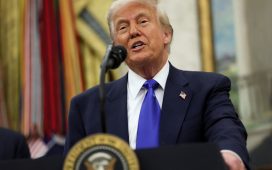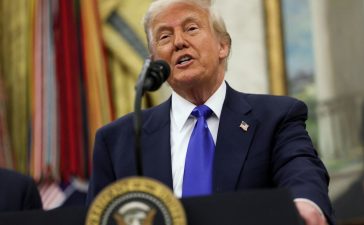People watch the presidential debate between Republican presidential nominee and former U.S. President Donald Trump and Democratic presidential nominee and U.S. Vice President Kamala Harris at a watch party hosted by the New York Young Republican Club, in New York City, U.S., September 10, 2024.
Adam Gray | Reuters
With fewer than 60 days until the election, investors may feel stressed by the flurry of tax policy proposals. Those emotions can trigger rash financial decisions, experts say.
Democratic presidential nominee Vice President Kamala Harris has plans for middle-class tax cuts while raising levies on the wealthiest Americans and corporations.
Meanwhile, former President Donald Trump, the Republican nominee, aims to extend tax breaks enacted during his first term and end taxes on Social Security benefits. Trump also supports higher tariffs, or taxes levied on imported goods from another country.
“There are sometimes knee-jerk reactions to some of these proposals,” said certified financial planner and enrolled agent Louis Barajas, who is CEO of International Private Wealth Advisors in Irvine, California.
More from Personal Finance:
Social Security cost-of-living increase for 2025 could be 2.5%
Here’s the inflation breakdown for August 2024 — in one chart
Harris wants a 28% capital gains tax rate. How it compares to recent history
But there’s a big difference between a candidate’s tax idea or proposal and signed legislation. Tax law changes require Congressional approval, and future control of the House and Senate remains uncertain.
“All sorts of things are in presidential budgets that don’t get enacted,” said CFP and financial therapist Rick Kahler, president of Kahler Financial Group in Rapid City, South Dakota.
Trump’s expiring tax cuts
We don’t make any changes until the law has passed.
Louis Barajas
nternational Private Wealth Advisors
“We don’t make any changes until the law has passed,” said Barajas, who is a member of CNBC’s Financial Advisor Council. Actions based on proposed tax law can backfire if the legislation isn’t enacted or details change amid lawmaker debates.
Plus, tax decisions need to align with long-term financial plans, he added.
Fear often comes from a ‘scarcity mindset’
Our emotions drive the vast majority of financial decisions, according to Kahler.
When a candidate proposes tax increases, “a scarcity mindset” often leads investors to believe that higher taxes will significantly reduce their resources, he said.
But regardless of your finances, you should “never make a decision when there is a strong emotion driving you,” Kahler said.
“If you’re scared to death, this is a good time to take a deep breath,” he said. “Emotions can get in the way of making a clean decision.”











